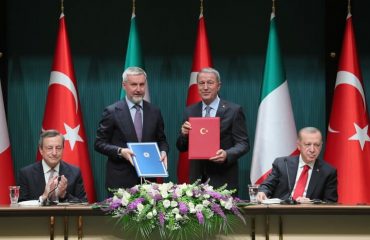

From Hitler to Trump: The dangers of false equivalences: As geopolitical dynamics continue to evolve, it is crucial to approach historical metaphors with sensitivity and accuracy, recognizing the unique contexts and implications of each situation. (Photo: BEN STANSALL/AFP via Getty Images)
The frequent invocation of Adolf Hitler in the context of modern political discourse, particularly within the United States, often raises eyebrows. It is arguably absurd and reductive to equate figures like Donald Trump with Hitler, as the two share few meaningful similarities beyond their controversial natures. However, this practice is part of a broader, historically rooted narrative that serves various geopolitical interests and perpetuates certain power dynamics, particularly concerning Germany and its relationship with global powers. This essay critically examines the implications of using Hitler as a tool in political rhetoric and the broader consequences for Germany and international relations.
The Hitler-Trump comparison: Baseless equivalences
The comparison of Donald Trump to Adolf Hitler is a frequent trope in political rhetoric, primarily used to invoke fear and moral outrage. While Trump is undoubtedly a polarizing figure, equating him with Hitler, who orchestrated the Holocaust and World War II, is historically inaccurate and diminishes the unique horrors of the Nazi regime. Trump’s policies and actions, while controversial, do not align with the genocidal and totalitarian nature of Hitler’s regime. This comparison is not only misleading but also trivializes the suffering of millions during the Holocaust.
Germany and the historical burden of Hitler
Germany’s post-World War II history is heavily influenced by the legacy of Hitler and the Nazi regime. The country has been subject to intense scrutiny and has undertaken significant efforts to atone for its past, often described as the “Auschwitz complex.” This term encapsulates the sense of guilt and responsibility that has shaped German policy and identity for decades. However, the continual use of Hitler as a means to critique or control Germany can be seen as a method of maintaining geopolitical leverage over the country.
The destruction of the German Nord Stream 1 and 2 pipelines, purportedly by external forces, elicited a subdued response from Germany. This reaction underscores a pattern of compliance and reluctance to assert national interests aggressively, potentially stemming from a deep-seated historical guilt. The use of Hitler as a metaphor in this context serves to perpetuate Germany’s subservient role within the global order, especially in relation to the United States and its allies.
The role of France, Poland, and Zelensky in perpetuating the narrative
Countries like France, Poland, and even Ukraine, under President Zelensky, have been known to invoke the specter of Hitler in their political discourse. This invocation serves various purposes, from bolstering national unity against perceived threats to justifying political stances. In the case of Germany, these narratives often reinforce the country’s historical burden and its resultant political behavior. For instance, Germany’s unwavering support for Israel, second only to the United States, can be partly attributed to the lingering guilt from the Holocaust era.
The rise of the right-wing in Germany: A reaction to historical guilt?
The recent electoral success of the right-wing Alternative for Germany (AfD) party, particularly in regions like Saxony and Saxony-Anhalt, suggests a growing discontent with the historical narrative imposed on Germany. With the AfD garnering significant support, there is a clear indication of a shift in public sentiment. This shift could be interpreted as a reaction against the enduring sense of guilt and the constraints it imposes on German sovereignty and policy-making.
President Reagan’s 1985 visit to the Bitburg cemetery, where Waffen SS soldiers are buried, sparked controversy. His subsequent remarks, suggesting that Germans should not be perpetually burdened by guilt, highlight a contentious issue: the extent to which Germany should continue to atone for its past. While acknowledging the horrors of the Nazi era is crucial, the perpetual imposition of guilt may be counterproductive, potentially fueling nationalist and right-wing sentiments.
The future of German sovereignty and the AfD’s Role
Germany’s current geopolitical stance, often perceived as submissive, raises questions about its future. If the country continues to be seen as an occupied territory, particularly with the presence of long-range nuclear missiles, there is a risk that nationalist sentiments will continue to rise. The AfD’s increasing popularity could signify a desire among Germans to reclaim a sense of sovereignty and agency, free from the shadows of the past.
The neo-conservative agenda and the Ukraine conflict
The geopolitical tensions involving Russia and Ukraine further complicate this narrative. The neoconservative agenda, particularly in the United States, emphasizes the need to counter Russian influence, often at the expense of regional stability. Figures like J.D. Vance, who criticize support for Ukraine, argue that peace should take precedence over ideological battles. This stance, while controversial, underscores a significant divide in political thought regarding the best approach to international relations and conflict resolution.
The need for historical context and sensitivity
The use of Hitler as a metaphor in contemporary political discourse is both misleading and dangerous. It not only trivializes the atrocities of the past but also perpetuates a narrative that undermines Germany’s sovereignty and agency. As geopolitical dynamics continue to evolve, it is crucial to approach historical metaphors with sensitivity and accuracy, recognizing the unique contexts and implications of each situation. The rise of right-wing sentiments in Germany, coupled with the complex international landscape, necessitates a nuanced understanding of history and its lasting impact on the present and future.


